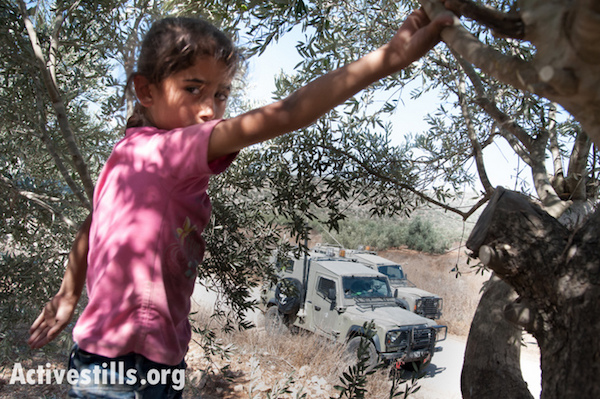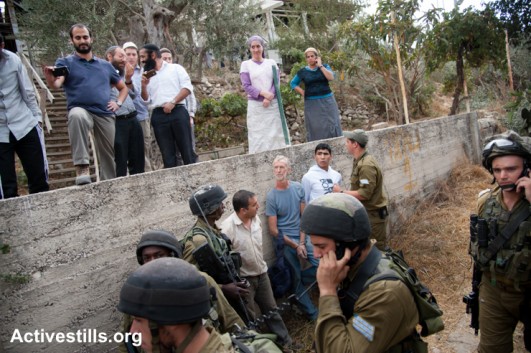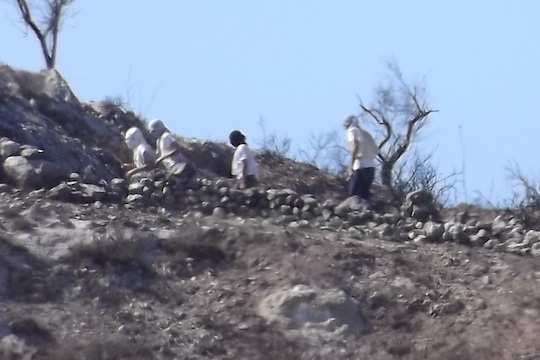Stolen fruit, destroyed trees and harassment by the army and settlers wreak havoc with the yearly olive harvest, an essential source of subsistence for West Bank Palestinians.
By Yossi Gurvitz, for Yesh Din

“The fruit of thy land, and all thy labours, shall a nation which thou knowest not eat up” (Deuteronomy 28:33)
“I’ve been taking care of my trees for 31 years. These are my trees, I planted them, they’re like my children,” says Ali Taher Ali Salah. He is standing in his toy shop in the village of A-Sawiya, watching the children coming and going, buying toys that cost a shekel each. Not far away, near a military base, are his olive groves. We visited him at the height of the olive harvest season in early November. Palestinians rely greatly on the olives and the oil they make from it for their livelihood. Some two months ago, before the official beginning of the harvest, Salah saw children — not much older than the ones who frequent his store — stealing the fruit from his trees, filling one sack after another. “I see them harvesting the olives, putting a sack under the tree. Can you imagine how hard it is for me to see someone else harvesting my trees, and I can’t walk over to him and ask ‘what are you doing?'”
Salah’s grove is located next to another grove that had been looted two weeks earlier. In this case the police arrived on the scene, but made it too late. In Salah’s case, the cops caught the minors red-handed and returned his olives to him, but the case against the thieves was closed due to their young age.
As far as Salah is concerned, the legal side is less important. The impotence by which a person sees his labor stolen before his eyes and can do nothing about it repeats itself time and again. “This should be difficult for me, but also for the State of Israel,” he says.
The latest information sheet we published regarding the olive harvest shows that the State of Israel does not care all that much. The military authorities claim they will permit the Palestinians to harvest their groves “until the last olive” — a policy they are beholden to by a High Court of Justice ruling handed down in the Murad case (Hebrew) only 12 years ago. But the reality is that all too often invisible hands reach the Palestinians’ groves, and Palestinians are often prevented from reaching them for the rest of the year. In the harvest seasons 2013-2015 Yesh Din documented 10 cases of harvest theft.
“Thou shalt have olive trees throughout all thy coasts, but thou shall not anoint thyself with the oil” (ibid, 40)
A short drive south from Salah’s shop brings us to the fields of Ahmed Sabah Fares Abu Nijmah from the village of Qarayut, near the settlement of Eli. He, too, saw Israeli civilians stealing his olives. Abu Nijmah is convinced the army is preventing him access to his trees before the settlers get to them, so as to allow them to get at them first. But he knows this is not the real problem: that lies with the dependency of the Palestinian farmers on the IDF’s strict permit policy, as described in the data sheet.

Almost all the agricultural land owned by Palestinians is in Area C, which is under full Israeli military control. Eighty-three percent of the land in Area C was allocated by the government to settlements. Illegal outposts have taken much more of that land. Palestinians are prohibited from entering these territories. This the formal side of the prohibition; the less formal is that of the ideological violence whose purpose is to expel the Palestinians from land they still have access to.
The main source of the problem is the army. It is the army that prevents Palestinians from accessing their land, and it is the army that does not protect Palestinian farmers suffering from settler violence — contrary to its duty under international law and High Court rulings. It is the army that limits Palestinian farmers to a small number of days in which they can reach their land.
Abu Nijmah noted that the harvest’s plowing season is in April. Plowing is essential to cultivate the trees and to air the soil. He received a permit to reach the land in August. “What’s the point of plowing in August? I’m ruining the trees,” he said.
By his estimates, prior to the Second Intifada he would produce a drum to two drums of oil from each tree. Since then, due to his inability to reach the trees and cultivate them properly, the output was reduced to about half a drum per tree. He has another plot of land, which he makes a point of visiting and cultivating: “Even if they kill me, I won’t leave it,” he said. These are ancient trees, which the Palestinians call Roman trees. His father planted them in 1940.
Recently he was met in the field by one of the Israeli civilian security coordinators (CSC). The CSC asked him what he was doing there — Abu Nijmah replied that he consistently plows the place and was never harassed there. The CSC pulled out his tablet, checked, and said “OK, I won’t touch you. Do whatever you want to do.” Abu Nijmah laughs: “This is what he said this year. Who knows what he’ll say next year?”

“And thy life shall hang in doubt before thee, and…thou shalt have none assurance of thy life” (ibid, 66)
Near Abu Nijmah’s are fields that belong to Saher Musa Yousef Musa. The pastoral view of the green olive trees is deceiving; this is an invisible battlefield. We meet Musa where villagers used to celebrate the harvest, years ago. This ended when the settlement was built. It’s too dangerous.
The IDF graciously permits him to reach one of his plots twice a year for three days each time. It isn’t enough, but in times of “trouble,” as he puts it, Musa does not use even this time. He is afraid. The trees in one of his plots were uprooted years ago, which he blames on Israeli civilians. The trees grew again but lost much of their quality.
Musa’s case is not unusual. In recent years, Yesh Din opened 25 cases dealing with incidents of destruction of trees, which took place or were discovered during the harvest season or close to it. The cases document 23 events of burning, cutting or poisoning of trees. Six hundred trees were found cut down; hundreds more were burned.
This year, Musa hoped that the harvest would pass peacefully. At the beginning of October he reached his land with his son and sisters; they harvested olives most of the day, and when they reached the last tree, Musa suddenly heard a voice saying “go away” in Hebrew. Musa replied that he wanted to finish harvesting the tree. The man, an Israeli known to Musa, began smashing the windows of Musa’s car, before slashing its tires.
“The settlers can kill me,” he says. He does not trust the army to protect him. “There’s no difference between the military and the settlers here. Press charges? What’s the point? To whom should you complain, when the judge is the enemy?”
Neither he nor Abu Nijmah have any illusions: the problem is not the settler outlaws, but law enforcement and the army’s permit regime: “Every time you see a settler close to you, take a good look. There’s a soldier behind him, guarding him. There’s no difference here between the soldiers and the settlers.”
So it goes.
Written by Yossi Gurvitz in his capacity as a blogger for Yesh Din, Volunteers for Human Rights. A version of this post was first published on Yesh Din’s blog.

